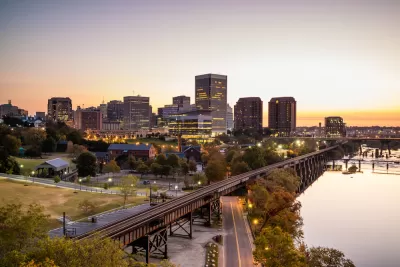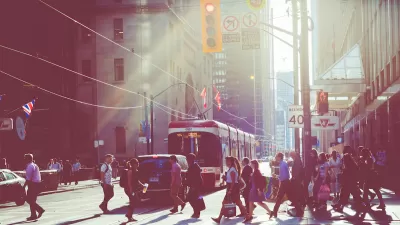Switching from property tax to a land value tax could rein in sprawl, boost urban density, and lower the cost of housing.

Connor Scribner argues that a land value tax could slow sprawl and help reduce the number of miles driven by Americans, who drive more miles per capita than any other nation. Even with a shift to electric vehicles, Scribner writes, sprawl has other negative environmental impacts. "In fact, while a switch to electric vehicles may decrease carbon emissions, it would likely increase the emissions of non-exhaust pollution. In order to accomodate long-distance trips, EVs need large batteries that make them heavier than gas-powered vehicles, meaning wear on and the subsequent pollution from tires and brakes is made worse."
Sprawl also destroys natural habitats, disrupts animal migration, and reduces biodiversity. Paved surfaces intervene with natural drainage processes and radiate heat, while stormwater channeled into natural bodies of water carries toxic pollutants and runoff.
According to Scribner, part of the reason sprawl takes hold is the cost of construction in the denser urban core. In Richmond, property taxes on buildings sometimes discourage property owners from developing a lot. By taxing even undeveloped land, the city could remove this incentive to let land sit unimproved. A 2015 research study found that "a land value tax would help to decrease the price of housing and increase urban density."
Scribner argues that a land value tax would benefit all Richmond residents rather than keep benefits with landowners and encourage more development on underused lots.
FULL STORY: Richmond’s urban sprawl threatens the environment. Taxing land may rein it in

Planetizen Federal Action Tracker
A weekly monitor of how Trump’s orders and actions are impacting planners and planning in America.

San Francisco's School District Spent $105M To Build Affordable Housing for Teachers — And That's Just the Beginning
SFUSD joins a growing list of school districts using their land holdings to address housing affordability challenges faced by their own employees.

The Tiny, Adorable $7,000 Car Turning Japan Onto EVs
The single seat Mibot charges from a regular plug as quickly as an iPad, and is about half the price of an average EV.

Seattle's Plan for Adopting Driverless Cars
Equity, safety, accessibility and affordability are front of mind as the city prepares for robotaxis and other autonomous vehicles.

As Trump Phases Out FEMA, Is It Time to Flee the Floodplains?
With less federal funding available for disaster relief efforts, the need to relocate at-risk communities is more urgent than ever.

With Protected Lanes, 460% More People Commute by Bike
For those needing more ammo, more data proving what we already knew is here.
Urban Design for Planners 1: Software Tools
This six-course series explores essential urban design concepts using open source software and equips planners with the tools they need to participate fully in the urban design process.
Planning for Universal Design
Learn the tools for implementing Universal Design in planning regulations.
Smith Gee Studio
City of Charlotte
City of Camden Redevelopment Agency
City of Astoria
Transportation Research & Education Center (TREC) at Portland State University
US High Speed Rail Association
City of Camden Redevelopment Agency
Municipality of Princeton (NJ)





























